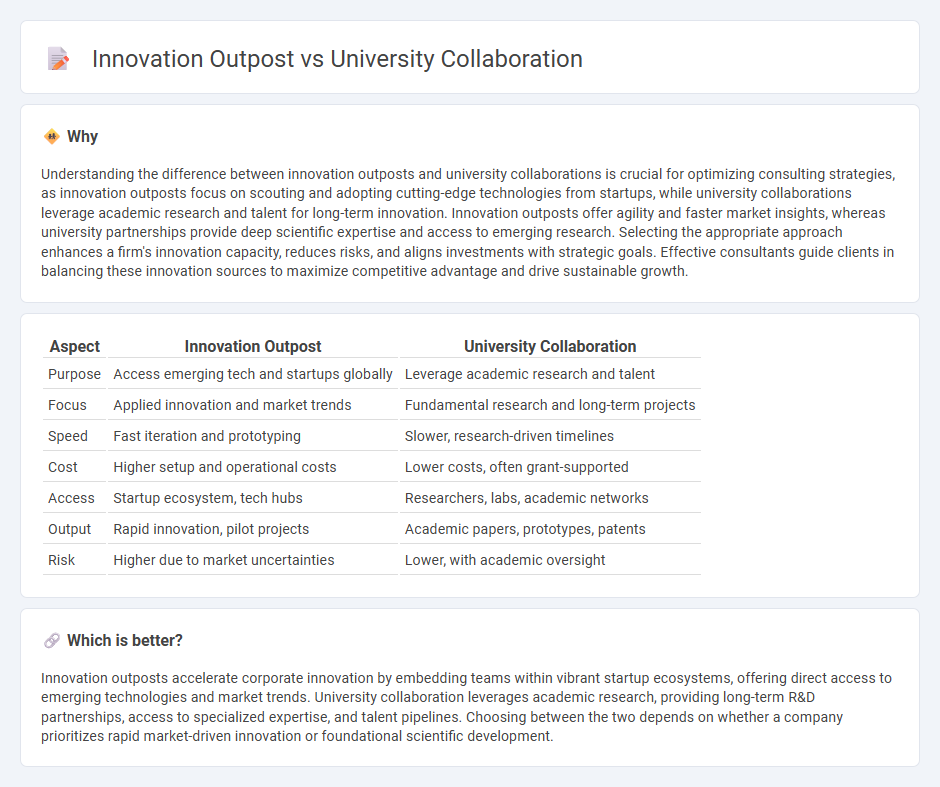
Innovation outposts offer companies direct access to emerging technologies and startups by establishing dedicated teams in global innovation hubs. University collaborations leverage academic research and foster long-term partnerships to drive breakthrough discoveries and talent development in specialized fields. Explore how integrating both strategies can maximize your organization's innovation potential.
Why it is important
Understanding the difference between innovation outposts and university collaborations is crucial for optimizing consulting strategies, as innovation outposts focus on scouting and adopting cutting-edge technologies from startups, while university collaborations leverage academic research and talent for long-term innovation. Innovation outposts offer agility and faster market insights, whereas university partnerships provide deep scientific expertise and access to emerging research. Selecting the appropriate approach enhances a firm's innovation capacity, reduces risks, and aligns investments with strategic goals. Effective consultants guide clients in balancing these innovation sources to maximize competitive advantage and drive sustainable growth.
Comparison Table
| Aspect | Innovation Outpost | University Collaboration |
|---|---|---|
| Purpose | Access emerging tech and startups globally | Leverage academic research and talent |
| Focus | Applied innovation and market trends | Fundamental research and long-term projects |
| Speed | Fast iteration and prototyping | Slower, research-driven timelines |
| Cost | Higher setup and operational costs | Lower costs, often grant-supported |
| Access | Startup ecosystem, tech hubs | Researchers, labs, academic networks |
| Output | Rapid innovation, pilot projects | Academic papers, prototypes, patents |
| Risk | Higher due to market uncertainties | Lower, with academic oversight |
Which is better?
Innovation outposts accelerate corporate innovation by embedding teams within vibrant startup ecosystems, offering direct access to emerging technologies and market trends. University collaboration leverages academic research, providing long-term R&D partnerships, access to specialized expertise, and talent pipelines. Choosing between the two depends on whether a company prioritizes rapid market-driven innovation or foundational scientific development.
Connection
Innovation outposts serve as strategic hubs that facilitate collaboration between corporations and universities by enabling the exchange of cutting-edge research and emerging technologies. These partnerships accelerate the development of new solutions and drive commercialization efforts, leveraging academic expertise and industry resources. The synergy created through this collaboration enhances competitive advantage and fosters sustainable innovation ecosystems.
Key Terms
University Collaboration:
University collaboration involves strategic partnerships between academic institutions and industries to drive research, development, and knowledge transfer, fostering innovation ecosystems. These collaborations leverage specialized expertise, cutting-edge research facilities, and diverse talent pools to accelerate technological advancement and commercialize breakthroughs. Explore how university collaboration can amplify innovation impact and create sustainable competitive advantages.
Research Partnership
University collaboration enhances research partnerships through joint projects, knowledge exchange, and resource sharing, driving academic innovation and industry impact. Innovation outposts serve as strategic hubs, embedding organizations within local innovation ecosystems to access cutting-edge technologies and talent pools. Explore how these approaches uniquely support research partnerships and innovation strategies.
Knowledge Transfer
University collaboration facilitates knowledge transfer through joint research projects and academic partnerships, enabling the exchange of cutting-edge theories and practical applications. Innovation outposts, often established by corporations in proximity to academic hubs, act as strategic nodes to access emerging technologies and talent pools directly. Explore how these models optimize knowledge transfer to accelerate innovation and commercial impact.
Source and External Links
University-industry collaboration: A closer look for academic leaders - This guide provides insights into university-industry partnerships, highlighting their importance, key characteristics, and strategies for successful collaborations.
Why collaboration is key to the future of higher education - This article discusses the role of collaboration among colleges and universities, showcasing examples where institutions work together to enhance student and faculty opportunities.
University-industry collaboration as a driver of digital transformation - This research highlights the benefits of university-industry collaborations, including access to resources, learning opportunities, and financial benefits, particularly in the context of digital transformation.
 dowidth.com
dowidth.com